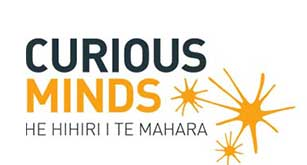
Community-led solutions for community challenges is the theme for the new Curious Minds South Auckland projects funded in 2023
After receiving a record 22 expressions of interest, Te Hononga Akoranga COMET is pleased to announce that we have funded 8 STEM research projects with over $136,000 awarded to schools and community groups through the Curious Minds South Auckland participatory science platform. The strong demand demonstrates the importance and value of giving ākonga opportunities to conduct real-world scientific research in their communities.
A wide range of research questions will be answered in the coming months, with many reflecting the changing needs and challenges that our communities are currently facing. These include science and design investigations around flooding mitigation, pest control, hauora, and sustainable food production, amongst others.
STEM project manager Ying Yang says, “Science, technology, engineering and maths are foundational skills for the 21st-century learner. Through participatory science, ākonga have a chance to put these skills into practice by solving real problems that have a real impact on their lives. What excites me most is the high level of community buy-in and support I’ve already seen this year, so there’s a very good chance that the research and solutions that ākonga come up with may go on to create long-term, positive changes that go far beyond the project.”
The eight projects funded this year are:
PŪTĀTARA - A CALL TO ACTION
Christ the King Catholic School
In response to recent flooding events in Tāmaki Makaurau, Christ the King Catholic School has sprung into action. Ākonga in years 5 and 6 will be investigating the local history of Puketāpapa and whether future flooding events in this area could be minimised by adopting a water-sensitive design approach to urban development. Working alongside stormwater engineers and environmental scientists, students will gain an understanding of stormwater systems and infrastructure, as well as what can be done to mitigate the impacts of flooding on people and environments.
KAITIAKI O TE PUNA
Aorere Kindergarten
Tamariki at Aorere Kindergarten will undertake an immersive exploration of their local streams and waterways in this project that will see them develop environmental responsibility beyond the kindergarten. Building on relationships with neighbouring schools, tamariki will learn from tuakana at Papatoetoe Intermediate School and Aorere College, as all three schools look to restore different sections of Waokauri Stream. They will start with an audit of the existing biodiversity and learn about what habitats and conditions are needed for taonga species to thrive in their awa.
INVESTIGATING EELS IN SOUTH AUCKLAND'S WATERWAYS
Whitebait Connection
Conservation groups and tamariki from across Manurewa, Franklin and Drury will work together to investigate eel populations in this project led by Whitebait Connection. It is hoped that understanding the number and distribution of eel populations in different types of streams will help reveal what habitats different eel varieties require, which will in turn inform future stream restoration and conservation efforts.
KAITIAKI OF MAUNGAKIEKIE
Royal Oak Primary School
Eco-warriors at Royal Oak Primary School will investigate the effectiveness of predator control on native bird populations at Maungakiekie / One Tree Hill. The school is trialling the use of innovative birdsong monitors to analyse the type and number of birds present, and observations over time are expected to help build a picture of the impacts of predator control efforts on bird numbers. The project is supported by science and community partners from the Tūpuna Maunga Authority, Maungakiekie Song Bird Trust, Predator Free 2040, the University of Auckland and Auckland Zoo.
OPERATION AUTOMATE CRYSTAL PALACE
Manurewa Intermediate School
Ākonga at Manurewa Intermediate School will use robotics and engineering design thinking to develop solutions for automating their school greenhouse (aka the Crystal Palace). The challenge is to maintain constant light, temperature and humidity so the greenhouse’s yield can increase while labour and maintenance requirements are minimised. By automating greenhouse functions as much as possible, the school hopes to create a more efficient nursery to grow native tree seedlings, which they will gift to their local Adopt a Park programme for planting near local streams and waterways.
THRIVE - SMART, SUSTAINABLE HORTICULTURE PRODUCTION
Youthtown Inc and Waiuku College
Year 11 horticulture students at Waiuku College have set themselves a challenge to make horticulture more sustainable using smart technologies and innovation. They will work with STEM experts from the University of Auckland and Youthtown to design and build a carbon-neutral, modular vertical hydroponic garden for growing vegetable crops. Located in rural south Auckland, rangatahi will leverage community knowledge on effective growing practices to inform their design and then share their innovations back to the local farmers and growers.
WAAHI WHAKATAA - A PLACE TO REST
VAKA Ltd and Edmund Hillary School
More than 100 Edmund Hillary students in years 7 and 8 will work together to design and build culturally responsive, environmentally friendly rest and play areas at their school to promote hauora, calm and well-being. These tauira will work closely with STEM experts at VAKA Ltd, who will guide the students through the design process, including how to use 3D modelling and printing technology for prototyping. Once they have a suitable design, students will be tasked with testing materials, costing it out and preparing a business case to present to the school’s senior management team.
TE KETE ROKIROKI A WHAKAOTIRANGI
Mount Roskill Grammar School
The Puketāpapa area once hosted extensive cultivation of kūmara, but in recent years, Mount Roskill Grammar School’s māra kai has only achieved poor and inconsistent yields. Students will get to the root of the problem and investigate various soil compositions, landscapes and traditional cultivation practices to determine which variables might help to improve their vegetable crop. Multiple garden beds will be planted with different soil types, and a fair testing experiment will be conducted to analyse which soil provides the greatest yield. This project is a collaboration with local iwi, Mahi Whenua, Māngere Mountain Education Trust and Kōanga Gardens.